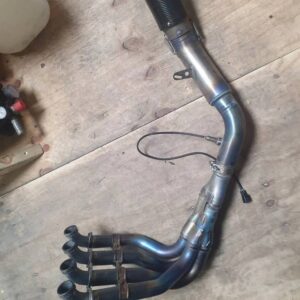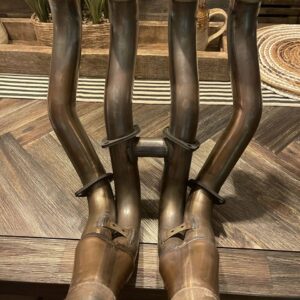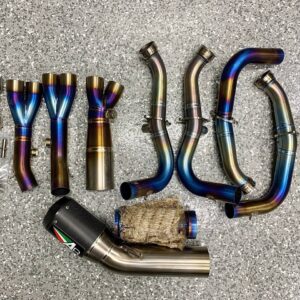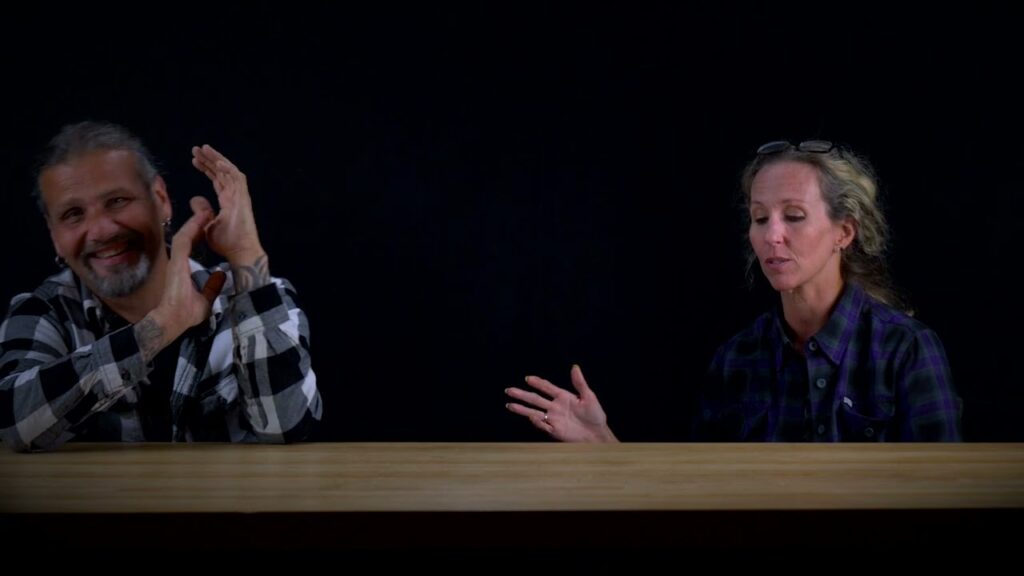In this final installment of our interview with Chris and Heather Callen of Cycle Source magazine we learn even more about what drives them in this industry. From how Heather joined the company and journey Chris was on to what is coming down the road for Cycle Source, we get even more in-depth with the Callens. Be sure to watch the first two parts of the interview to hear their whole story.
We sincerely appreciate the Callens sitting down with us for this interview and we can’t thank them enough for their partnership. They are truly salt of the earth people and are exactly who the motorcycle industry needs as storytellers and historians.
Transcript Below:
Chad: So Heather, than for you, you know, you meet him, he’s crazy and wild, doing his thing, he’s got this business going that is equally crazy and wild and like, you mentioned it earlier, like Chris the man is easy enough with the passion and what not to want to hitch on and Follow that dream. But you still got the business. So like, what makes you come in and go like I not only want to be a part of this man’s life, I want to be a part of this business?
Heather: You know honestly, it just happened. Like, it literally just happened. Like he’s like, “hey you know, I need…” I think it started with an Excel spreadsheet. Like his subscriber list or something stupid like that and then next thing I knew I was managing editor and like and all of the stuff and I’ve learned more about this business and Photoshop and video editing and things that I never ever, ever thought I would. Like it literally just happened very, very organically. It wasn’t a question of do you want to do this. It was, “here do this”, do you know what I mean? It’s like if you’re going to be a partner in my life, you’re a partner in everything I do.
Chris: Well, otherwise we’d spend no time together.
Heather: Right.
Chris: You know because it’s, this is not something that was a job.
Heather: No it’s not. It is our life and actually a young, a young kid asked me just last week in Arizona, he said, “how do you balance work life, shop life and life life?”
I said you really don’t. There’s work life and shop life every now and then. You’ll sneak in a little
bit of life life and you just make it count as much as you can. Otherwise, yeah, you know, and eventually there will be more life life, you know. And you’ll have those moments.
Chris: And there, you know, we talked about this when we came in, there are times that we’ve had in our ever fleeting life life moments,
Heather: Amazing moments!
Chris: We’ve woke up to a sunrise on the southern rim of the Grand Canyon. We’ve, you know, raced through the night to have café au lait and beignets at Café Du Monde, you know, like things that are like lifetime goals for people. Like we get to do stuff like that.
Heather: You know, we’re blessed with we get to go to Sturgis every year. I’ve been to Sturgis every year for 15 years and not only do I now get to go to Sturgis, I get to help people make memories in Sturgis. it’s pretty rad. You know, like we get to climb Baraboo and we we’ve been all over this country because of motorcycles and motorcycle people. You know I’ve met some of the greatest people on the Earth doing this and I wouldn’t change it. Well most days I wouldn’t change it.
Chris: She was in a pivotal, a pivotal moment as well because…
Heather: Yeah the Broken Spoke had just sold and you know I had done that for 10 years. They had just sold and I was kind of in limbo and it was like well if I’m going to do it, I’m going to do it. So I picked up my, you know, my daughter and I moved to Pittsburgh, Pennsylvania. My son was already off in the Marine Corps. You know she was she was 15 I think when we moved. Yeah and um it literally it just kind of happened and I’ve kind of grown into it over the years.
Chris: So we’ll have to send you apicture to use at this point. When we tell this part of the story, but there’s a motorcycle. It was my first ever bike in Michael lichter’s show and the exhibit that year was called Skin and Bones. One day when I came home a couple years before Heather moved in with me, there was an old 73 Iron Head parked in my driveway. It was every stinky bad decision you ever saw. You know, it was white-ish, mostly yellow and brown like and just leaking from everywhere and looked like it had been drug through a mud puddle. And it had a sign on it that said make something cool out of me. Well I took it inside and cleaned it off a little bit and a buddy of mine called me. He said hey, he said I you know got this in a deal with a couple other things. He said I don’t want an Ironhead, so do it just, do something with it. I took it all apart and put it all up on the shelf and I was like someday I’ll get to it. I’ll make it into something cool.
When she first moved in with me and decided you know, we decide okay that’s what we’re gonna do this with me. This is going to be our thing. I took that down and I said so the first thing we’re going to do is you’re going to build a bike with me. And she was like okay. And I said not because…
Heather:I do not come from a motorcycle background at all.
Chris: And I said not because I want you to be you know Betty bike builder. I said if you’re going to be involved in telling stories of people who really put everything they have into these motorcycles, I want you to understand what they go through. I want you to know from the start to the finish of a build. I want you to understand what’s involved in that. I want you to understand it from their perspective. So I made her come out in the shop and grind and plan and you know fetch parts with me and everything the whole way through it.
Heather: And then take it back apart when we needed to engrave it. We had the bike 100% complete and MFL, God love him, calls and says, hey I’m doing this exhibit this year. You know I’d love to have you but you don’t have a bike that fits it do you? And again Skin and Bones it was all tattoo and things like that and he says yeah I’ll just, I’ll pull the motor and engrave it. I know we had just finished it. So we pulled the motor and we laid it out and we engraved everything, like the entire case, like rocker boxes and everything and um which was cool because…
Chris: Which was super cool. We named the bike “Board to Death”
Heather: It was a take on b-o-a-r-d. Take on like a board track racer and then the Wall of Death.
Chris: It was a tribute to the Wall of Death. So all of the engraving became like the when you go to see The Wall of Death they have these Carnival barks that they put out. You know crazy riders. Crazy crazy drivers motorcycle, maniacs. We put those all over it.
Heather: So that was the first time he was ever in Michael’s exhibit and the worst part is we weren’t even there for the picture. We weren’t even there for the pictures. We were, I think we were doing a show or something crazy like that. But no I gained a whole new respect for motorcycles and motorcycle builders and I’ve learned so much over the years. Because you know, coming from the Broken Spoke and being a bar manager, yeah I was part of the motorcycle world, but I wasn’t part of the motorcycle world you know what I mean. I just hosted them and you know got them drunk and sent them on their way. It was great but over the years I’ve learned so much about motorcycles and motorcycle community and people and it’s been more than I ever thought I would you know.
Chris: Because it’s funny, especially now, people that don’t know or will be somewhere and you see a guy come up to her and want to treat her like the typical little blonde and say something to her and she’ll go no it’s not.
Heather: Yeah like last week, they’re like oh look at that Pan Head. I’m like that’s great. it’s not a Pan Head. it’s actually a Sportster. And they’re like oh yeah I guess you’re right yeah and they walk away.
Chad: You know where is the passion for motorcycles and motorcycle building you know that leads up to Cycle Source and everything you’ve done with Cycle Source and you know really the builder you’ve become recognized as through Cycle Source, you know, where does all that come from back in the youth?
Chris: You know the beginning of, the beginning of the motorcycle thing for me is that as that thing I repeat all the time about how motorcycles saved my life you know. My mom was a an IV drug abuser. You know I was in, I was in horrible situations growing up and I’m not saying that because I want anybody’s pity, but every situation you can imagine. I mean she was, she was a prostitute. There were always junkies around my house. I quit High School in 10th Grade because the parallels of those two worlds were just… it was unconscionable you know.
But um it wasn’t until I found myself around a group of men that society said were the The Lunatic Fringe, you know. They’re loud motorcycles and their naked booby parties. This was, these were the crazy people. But it was mostly Vietnam veterans you know that couldn’t find their way back into regular society but they found each other. And those guys taught me values you know they taught me respect for myself, for other people. To keep my word. To take care of my equipment. To you know, they in short, they taught me to be a man and it all happened through motorcycles.
So in Pittsburgh, Pennsylvania especially, it’s not a question of if you can build a bike, if you can work on a bike, if you’re going to ride a motorcycle. It’s a very depressed community. It always has been and if you’re gonna, if you’re gonna have something, nine times out of ten, you’re not going to be the guy in the neighborhood with the money that can have somebody else do the stuff for them. You’re going to be the guy that learns how to do it. So we had a great network and enforced community over the fact that like maybe this guy could paint, this guy could weld, this guy was good at tuning carburetors. You know like everybody had something they contributed. But you did stuff you know and the the idea of bike building like from scratch it wasn’t as much that as you know my first 1981 Super Glide in the time that I owned it was 14 different motorcycles. Because I was never going to have 14 different bikes, but every year I could go to little aftermarket store and maybe this year instead of having Fat Bob tanks, I’d get a Frisco Sportster. Instead of having a wrap around fender, I was going to run a Bobtail fender and you know instead of baloney cut exhaust pipes, I would get some kind of you know, cool kick-ups or something like that or I might find a Springer one year at a at a swap meet and figure out how to use that. So that was what we did all the time and I guess the the nature of, you know, of back backyard engineering to figure out how to make these pieces fit and everything that went with it.
Heather: That and I think like I’ve never known anybody to have a thirst for knowledge like him. Like when he wants to learn something new, he immerses himself in it. Whether it be how to engrave or paint or play music or learn how to digital broadcasting. Like he literally immerses himself in it and I think some of that stems from he has to prove that he can do it.
Chris: Yeah that wasa hang up from Clinton School. Clinton School was that broke my heart. I did because I was, I was never dumb and I mean immediately, after school, after I quit, I went and got my general equivalency but I never wanted someone to be able to say that I was, that I lacked intellect you know. But I do, still this day I, I forced myself into situations. Like we just completed the Chopper Friend’s Throwdown and I built you know my first scratch built frame. You know which for as a builder that’s a monumental achievement. But for me, I think more of the achievement was the fact that I learned enough about my milling machine that I’ve owned for seven years now to be able to make the components to go over and build that frame from scratch. You know what I mean. Like it was seven years ago, a very dear friend of mine was selling his business.
Heather: Was that long ago? Oh Jeepers
Chris: AndI went to the auction and he had a he had a manual machine shop and I bought his very first machine that he ever bought new as a young man. And she was kind of pissed that I bought it. And you know I bought it and I put it in the garage and for seven years all she has seen is this great big milling machine in the middle that cost you know. And the whole time she’s like when are you gonna do something with this. I’m getting the colics together, I’m buying bits here and there. I get advice. Like it takes time when you don’t do that stuff for a living. You can’t just go out and say okay well here’s nine thousand dollars, give me everything that I’m gonna need to run a milling machine. Because first of all, you won’t get everything that you need. You don’t even know what you’re buying. You know and secondly it’s just, you’re never going to convince your wife if you’re not making money with that machine. You’re not going to convince your wife that you can go do that.
Heather: Pretty much now I’m just like okay whatever.
Chris: So I got the, I got all the stuff and that was, that was the big achievement was I can use a mill. It’s pretty sexy.
Heather: Oh Lord hold me.
Chad: Heather you can start to get in Chris and start getting the motorcycle world through his eyes essentially and you found you know your own love for it too. What about this part of the culture that you’re going to introduce to that you fell in love with?
Heather: First of all, I have to tell you his warning label was not big enough. Like it should have been way bigger because I had no idea what I was… I literally had no idea what I was getting into. You know, I think it’s really the people that hold true to the core values. Because I think so much is lost in today’s society. But when we really dig deep and we get those minutes to sit down and talk to people, especially the ones that have been around for a while, those core values do still exist. The honor and the respect and the kindness and generosity and the fact that you know we’re blessed that we can go pretty much anywhere in this country. And if something happens we can be like okay you know I need this or does anybody have that or can I crash at your place tonight or whatever.
But it’s really going to be the people. I mean I love motorcycles in general. I mean I’m a self-proclaimed Chopper chick through and through. I mean I’ll never deny the craftsmanship on the on a lot of the other bikes but I love Trappers sorry but it’s really the people. Like you know, I don’t know that I’ve ever known a more generous demographic than the motorcycle community. I hate the word biker. I’m sorry. So we’ll always be a motorcycle community. I think that’s really it, whether it be needing help because you’re in an accident or somebody was an accident or somebody was sick or you know I started this project last year called “Tankfull”. You know, it’s, everybody deserves a full tank and I, you know, I got some tanks donated by Paughco parts and I reached out to a bunch of different artists across the country and it said hey can you paint these for me? I’m going to auction them off. Well through that first year event, I donated $15,000 to Meals on Wheels. Through the motorcycle community. There’s no other community out there that would do something like that and it happens time and time and time again. A brother goes down on a motorcycle and there’s a GoFundMe and you know fifty thousand dollars to make sure that he can just get by until he can get back to work. Or you know, even right down to somebody’s dog is sick you know what I mean. Like they’re just so kind and generous. And not all of them, I mean it’s just like everywhere else there’s The Good the Bad and the Ugly, but by and large they’re just good honest hard-working people you know.
Chris: I think the other part too Heather had a and she’s gonna kill me for taking this there but Heather had a very close relationship with her father. And her father from, I didn’t actually get to know him personally, but through the stories and personal accounts I think he was affected with a certain amount of Wanderlust as well.
Heather: Oh absolutely. Absolutely I can’t.
Chris: You have to. That’s the story man.
Chad: When you guys got the opportunity to get involved with Garage Build you know, at the time it was just an idea and you know you heard about this idea and you wanted to run with it you know, what was that like why did you guys want to get involved with Dennis Kirk and their Garage Build program and to be a part of it?
Heather: Van I take that one? I think mostly because like the biggest thing with Dennis Kirk and their Garage Build program, it’s very rare that you see a company as big as Dennis Kirk provide a platform for people to share their passion without expecting something in return. Like there’s no purchase necessary to submit your motorcycle and to share your story of what you’ve just spent sometimes your life’s work on you know. Some people spend their entire life working on one motorcycle. And they give them the opportunity to share with the world what they’re doing and their story and again they don’t expect anything in return. That’s so rare in today’s day and age you know. Like I don’t see any other companies doing that without that, without an expectation. Without their hand out you know. Of course, yeah in the end maybe they may go to Dennis Kirk and buy a part that maybe they don’t have. Maybe they fabricated everything they put on that bike themselves but don’t have a way to share it with everybody. They provide that to them and that’s, for us, we’re storytellers so the fact that Dennis Kirk lets people tell their story, it’s, it just was a perfect fit for us.
You know we’re a Grassroots publication. I can’t even say publication. We’re a media, Grassroots media outlet and we want to share those stories so to have somebody with a similar goal in mind want to work with us, it just seemed like the perfect fit.
Chris: Well and you know too, again to go back to where I’m from and how motorcycling was coming up, the garage part you know, so many people, so many people especially in this day and age are looking for that influencer or you know name brand that they can add to a program like this. To see to see somebody reinvest in the beginning of this and where it started for me personally, you know I see aa lot of value on that a lot of value on the fact that that the work that’s being done with garage builders, planting seeds of a crop that we may never see you know what I mean. It’s continuing that passion and continuing to show that there’s something that exists outside of the, of the retail opportunity of this that we all share.
Chad: What’s next for Cycle Source?
Heather: I think you know, I think Cycle Source is going to keep evolving. You know for us, so many people focus on looking forward but with us it’s just as important to look back to where everything came from and where it started. And we have to tell those stories of those before us.
Chris: Because again, now popular culture is kind of “meh, motorcycles.”
So here we are responsible for keeping our own history again and now we don’t have the benefit of all those magazines.
Heather: Right. You know to think, to think about you know that 25 year old kid that’s that’s on a Knucklehead chopper not knowing who Sugar Bear is or who Dave Perowitz is or you know. That’s heartbreaking and we need to we need to keep that alive to keep this industry going I think.
Chris: And that’s, that’s the danger we talked about with the fragile nature of social media’s shelf life. There’s nothing that has that archival quality now. So at least with magazines your dad used to have boxes of them sitting over there. If you really wanted to learn something it was in one of those magazines you know. You flip through stuff until you saw something on S U carburetors. Okay cool.
Heather: So I think you’ll see, you know, Cycle Source will still always be print. it’ll still be always on social media as long as that still exists. You’re gonna as long and I think you’ll be able to turn on your TV and see Cycle Source too in some way shape or form. So I think I think that’s what’s coming down the road is we just keep evolving and growing and I get a little bit older and a little bit grayer and a little bit crazy a little bit crazy.
Chad: Well to close it out then, if you guys wouldn’t mind telling the audience where can they find everything Cycle Source?
Chris: Pretty much if you just search Cycle Source Magazine. You know YouTube all the social media.
Heather: Instagram. Facebook, YouTube, website. All Cycle Source Magazine and every Sunday yeah Sunday night game same Chopper Channel Shop Talk.





